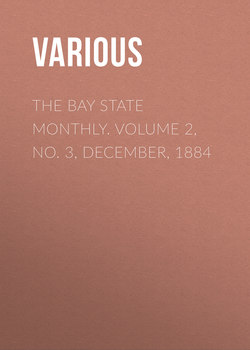Читать книгу The Bay State Monthly. Volume 2, No. 3, December, 1884 - Various - Страница 3
New England Conservatory of Music
ОглавлениеBy MRS. M.J. DAVIS
One of the most important questions now occupying the minds of the world's deepest and best thinkers, is the intellectual, physical, moral, and political position of woman.
Men are beginning to realize a fact that has been evident enough for ages: that the current of civilization can never rise higher than the springs of motherhood. Given the ignorant, debased mothers of the Turkish harem, and the inevitable result is a nation destitute of truth, honor or political position. All the power of the Roman legions, all the wealth of the imperial empire, could not save the throne of the Cæsars when the Roman matron was shorn of her honor, and womanhood became only the slave or the toy of its citizens. Men have been slow to grasp the fact that women are a "true constituent of the bone and sinew of society," and as such should be trained to bear the part of "bone and sinew." It has been finely said, "that as times have altered and conditions varied, the respect has varied in which woman has been held. At one time condemned to the field and counted with the cattle, at another time condemned to the drawing-room and inventoried with marbles, oils and water-colors; but only in instances comparatively rare, acknowledged and recognized in the fullness of her moral and intellectual possibilities, and in the beauteous completeness of her personal dignity, prowess and obligation."
Various and widely divergent as opinions are in regard to woman's place in the political sphere, there is fast coming to be unanimity of thought in regard to her intellectual development. Even in Turkey, fathers are beginning to see that their daughters are better, not worse, for being able to read and, write, and civilization is about ready to concede that the intellectual, physical and moral possibilities of woman are to be the only limits to her attainment. Vast strides in the direction of the higher and broader education of women have been made in the quarter of a century since John Vassar founded on the banks of the Hudson the noble college for women that bears his name; and others have been found who have lent willing hands to making broad the highway that leads to an ideal womanhood. Wellesley and Smith, as well as Vassar find their limits all too small for the throngs of eager girlhood that are pressing toward them. The Boston University, honored in being first to open professional courses to women, Michigan University, the New England Conservatory, the North Western University of Illinois, the Wesleyan Universities, both of Connecticut and Ohio, with others of the colleges of the country, have opened their doors and welcomed women to an equal share with men, in their advantages. And in the shadow of Oxford, on the Thames, and of Harvard, on the Charles, womanly minds are growing, womanly lives are shaping, and womanly patience is waiting until every barrier shall be removed, and all the green fields of learning shall be so free that whosoever will may enter.
Among the foremost of the great educational institutions of the day, the New England Conservatory of Music takes rank, and its remarkable development and wonderful growth tends to prove that the youth of the land desire the highest advantages that can be offered them. More than thirty years ago the germ of the idea that is now embodied in this great institution, found lodgment in the brain of the man who has devoted his life to its development. Believing that music had a positive influence upon the elevation of the world hardly dreamed of as yet even by its most devoted students, Eben Tourjee returned to America from years of musical study in the great Conservatories of Europe. Knowing from personal observation the difficulties that lie in the way of American students, especially of young and inexperienced girls who seek to obtain a musical education abroad, battling as they must, not only with foreign customs and a foreign language, but exposed to dangers, temptations and disappointments, he determined to found in America a music school that should be unsurpassed in the world. Accepting the judgment of the great masters, Mendelsshon, David, and Joachim, that the conservatory system was the best possible system of musical instruction, doing for music what a college of liberal arts does for education in general, Dr. Tourjee in 1853, with what seems to have been large and earnest faith, and most entire devotion, took the first public steps towards the accomplishment of his purpose. During the long years his plan developed step by step. In 1870 the institution was chartered under its present name in Boston. In 1881 its founder deeded to it his entire personal property, and by a deed of trust gave the institution into the hands of a Board of Trustees to be perpetuated forever as a Christian Music School.
